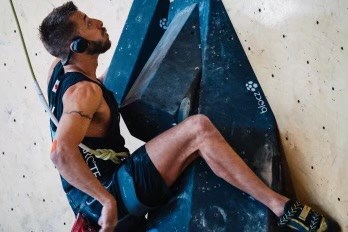On the back of a silver medal finish at the Paraclimbing World Cup in Salt Lake City, Stratford rock climber Chaz Misuraca is reaching for new heights this summer as he ventures further into sporting success.
This year, Misuraca, 35, was selected to Team Canada, becoming the first visually impaired Canadian rock climber to represent the country at an international competition.
At 32, Misuraca was diagnosed with Leber hereditary optic neuropathy (LHON), a condition that affects about one in 50,000. There is no cure for the disease.
Today, Misuraca has less than 10 per cent of sight left in both eyes.
With a podium finish already under his belt, the Stratford native will now travel to Villars, Switzerland in early July to compete in the IFSC Paraclimbing World Cup.
“Hopefully I can take home another medal,” Misuraca said.
Before the competition, he’s also been invited to Paraweek, a week-long event focusing on expanding the sport of para climbing.
“I’m going to learn about how to grow Canada’s para rock climbing. The week isn’t just for visually impaired people, but for any disabled athlete,” Misuraca explained. “It’s going to benefit a lot of people in the future.”
Prior to that, he’s heading back to Utah for continued training and to give a talk and climb with kids at a local gym about what it’s like to climb with a disability.
Also on his summer agenda is a trip to Germany with New Zealand para climber Rachel Māia. Misuraca, along with Māia, who is a knee-down amputee, will attempt to achieve a new high grade – that is, successfully complete the hardest route either has ever climbed.
And as if scaling mountains isn’t enough, Misuraca’s athletic aspirations don’t stop at rock climbing.
Later in July, the father of two boys, 8 and 11, will venture to Halifax where he’s been invited to the Canadian National Blind Hockey team tryouts, with hopes of making the team.
“It’s been a goal of mine since I went blind three-and-a-half years ago,” he said. “Hockey is Canada’s national sport and I thought it would be pretty cool to make the national team, so I started dedicating my time training for that and it’s paying off that I finally got an invite to the tryouts. Hopefully in August I officially make the team.”
Still, he plans to continue balancing both sports. “It’s really exciting to see where life takes me.”
Despite his growing list of achievements in para climbing, Misuraca noted the sport is vastly underfunded. He’s now crowd funding to help cover the costs of training, travel and competition.
He says future successes will help increase the profile of para climbing in Canada, with hopes of the sport being included in the 2028 Paralympic Games.
He also hopes his personal story of overcoming alcoholism inspires others.
Struggling with alcoholism even prior to his LHON diagnosis, Misuraca said he fell into a deep depression as his vision deteriorated, turning to alcohol as a coping mechanism. Today, he’s now sober and part of a 12-step program, emphasizing the importance of prioritizing his mental health.
“One thing I love the most about rock climbing, it gets me out in nature, you’re away from the city and the noise. Climbing the side of a mountain, there’s very few people if anyone there – it’s very pure and very beautiful and natural,” he said.
He says rock climbing has become a form of meditation, helping him stay in the present and calm his mind.
“Rock climbing helped me in my sight loss journey and gave me a reason to get out of bed in the morning,” Misuraca said. “I wanted to have this awesome experience. I didn’t want to miss out on it.”
But just like scaling a rock wall, he noted the journey to sobriety hasn’t been linear.
“I had a drinking problem on and off before I lost my sight. I tried to quit numerous times. When I lost my sight, I quit drinking,” Misuraca explained, adding living out on the road, hiking and conquering mountains – adventures even many sighted people don’t accomplish – helped keep him sober.
“But then I would come home and see my kids and I’d instantly be reminded of how blind I am,” he said. “I’d be struggling just trying to cross the road without being hit by a car, even after I just scaled a mountain no problem. That would really bring me down, so I would turn to booze to numb out and not feel, to try to turn off my emotions.”
Misuraca said he’s since realized that cycle simply masks the deeper issues.
His message for those struggling with alcoholism, or for those with disabilities, is “don’t run and hide from your problems, keep moving forward,” and to learn from both past achievements and failures.
“When something gets hard, don’t quit, keep pushing through,” Misuraca said. “When you get to the top of the mountain it doesn’t mean it’s over, there’s always going to be another mountain to climb – not just in rock climbing, in life. We’re always learning and growing. If we keep an open mind to that, we’re unstoppable.”



